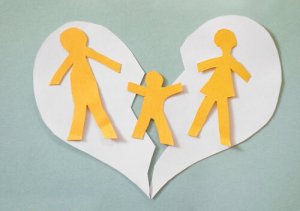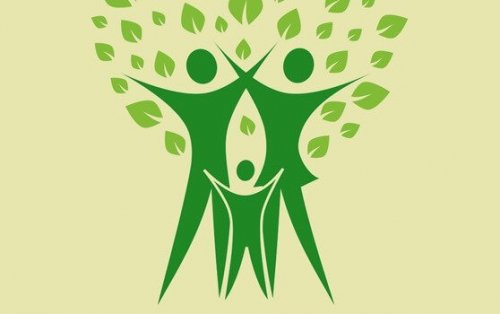Roles within the Family

A family is an organized system and the basic nucleus of society. In other words, it’s a collective with rules, values, and certain behavior standards. There are also hierarchies and roles within the family. All of that is also reflected in society.
The way that members of a family relate to the rest of society determines how they relate to each other. Each family has a set of guidelines about what is right and wrong and, in general, they communicate those ideas through their actions. They also have specific ideas about what each member of the family should do. That’s how the roles within the family are defined.
The definition of each role and how it plays out within the family is very important for everyone’s mental health. It’s imperative for establishing clear and healthy bonds. This might seem obvious, but these days it isn’t that simple. The result is a society in which hierarchies, authority figures, and the boundaries of the ego aren’t clear.

The primary roles within the family
Among the family roles, the most basic and decisive role is the conjugal role. It’s also the one that can become very confusing over time. It’s made up of the couple in question and consists of the set of spaces without kids, such as sexuality, family decisions, the emotional connection between partners, etc.
Then, you have the maternal and paternal roles. The definition of these roles depends a lot on the cultural context, but there are some common elements that you see in practically every culture:
- The maternal role is fundamentally emotional. Its function is to provide protection and support to the child.
- The paternal role, on the other hand, is in the middle of the mother-child. It expands the limits of the mother-child dyad and marks the boundaries of what is allowed.
The other roles within the family are the sibling role and the child role. The first is between brothers and sisters and serves the purpose of establishing the foundation for a cooperative relationship between peers. The second is the bond that children have with their parents. It has to do with respect for hierarchies and internalization of the meaning of authority.
Problems with the conjugal role
What we’ve described up until now is the theoretical framework of family roles. However, they don’t always look like this in real life. If the parents break down their role and allow their children to come into their sphere, the consequences can be serious.
In general, children who witness conflicts between their parents feel guilty and anxious. The seriousness of the consequences for the children depends on the intensity of the conflicts. In all cases, one or both parents will lose part of their authority during these conflicts.
It’s not good for children to see their parents expressing themselves sexually either. This can be very confusing for them. Depending on how old the children are and how much information they have, it could scare them, arouse them, or upset them. The consequences are varied, but they generally interfere with normal development.
The maternal and paternal roles
Parents play the most important role within the family unit. First, as the couple, and then as the mother and father. All of these roles are related to each other. The ideal maternal role is the “nourishing mother” who takes care of her child and offers tenderness, physical affection, and emotional support.
Some women, however, turn their children into their sole objects of love. They disregard or disparage the father and create possessive and overprotective bonds with their children. There are also absent mothers who won’t create any bonds at all with their children. In either case, the emotional effects are similarly devastating.
The father figure or paternal role usually establishes the guidelines for acceptable behavior. The father is the third figure who regulates the symbiosis between mother and child. He “saves” the child from being exclusively confined to the maternal universe.
These days, society tends to undervalue the word “father” and the paternal role. An absent father or a father who exercises his role in a weak way will have a hard time defining boundaries with his child. Children of these types of fathers don’t usually know what their limits are.
All cited sources were thoroughly reviewed by our team to ensure their quality, reliability, currency, and validity. The bibliography of this article was considered reliable and of academic or scientific accuracy.
- Alberdi, I. (2004). Cambios en los roles familiares y domésticos. Arbor, 178(702), 231-261.
This text is provided for informational purposes only and does not replace consultation with a professional. If in doubt, consult your specialist.








